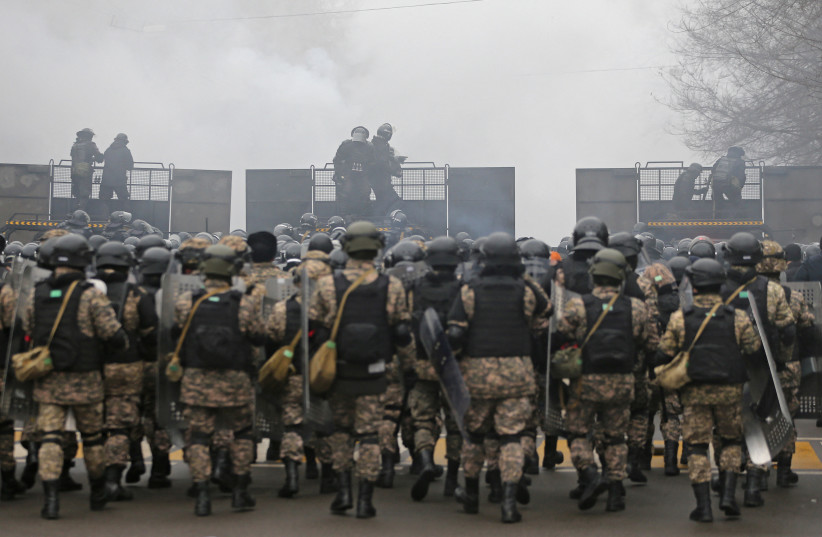Authoritarianism is increasing around the world, but one leader of a Central Asian republic is going against the grain and working to expand democracy in his former Soviet state. On June 5, Kazakhstan held a constitutional referendum that included proposals to limit the power of the presidency – a step initiated by current President Kassym-Jomart Tokayev.
This referendum passed with over 75% of people voting for major constitutional reform that, if fully implemented, would transform the country into one of the leading democracies in the region.
Like many former Soviet states, corruption and anti-democratic trends have plagued Kazakhstan since its independence. Even though Tokayev has been in office since June 2019, until recently, former president Nursultan Nazarbayev and his dynasty of oligarchs still controlled Kazakhstan and most of its wealth, and the government was hardly representative of the people – until now.
In January, violent riots erupted in an attempted coup against Tokayev by the holdovers from the Nazarbayev regime, and while the instigators were arrested and the riots quelled, many of the protestors had legitimate concerns about the structure of government and the lack of transparency in Kazakhstan.

Ultimately, the people were demanding an end to the corrupt old regime and calling for a more responsive, accountable and democratic government. While Tokayev could have fought the demands, continuing on the authoritarian path of Nazarbayev, he instead decided to limit his own power and meet the needs of the people.
In a speech on March 16, Tokayev promised sweeping reforms to roll back the kleptocracy and install a genuine democracy. His speech outlined a ten-point plan for wholesale transformation of the country’s political system, including a constitutional referendum that citizens approved this month.
Tokayev’s remarkable courage cannot be overstated, given the fact that he is a political insider and a direct product of the authoritarian Soviet school of thought. He even earned a Ph.D. in political science from the elite Moscow institution that trained all the best Soviet diplomats.
Tokayev served as Kazakhstan’s minister of foreign affairs for 10 years during the 1990s and the 2000s, and also served as deputy prime minister and prime minister. He was the chair of the senate for 10 years before becoming president in 2019. In these positions, he saw up-close the corruption and mal-administration in Kazakhstan’s state bureaucracy, which was certainly part of his motivation for trying a new approach.
One of the core changes in Tokayev’s proposals is ending the super-presidential system that places the presidency constitutionally above all branches of the government. In the new system, the presidency resides inside the executive branch, complemented by a strong parliament with budget-auditing authority, as well as by an empowered judiciary, including a re-established constitutional court. The amendments to the constitution introduce proper checks and balances for the first time among the three branches of Kazakhstan’s political system.
The president’s ability to monopolize power through party loyalists will also be severed by prohibiting party affiliation for many key roles, including judiciary, election authority, military, security services, parliamentary auditors and the standing president (Tokayev himself has already stepped down as chair of the ruling Amanat party). Close relatives of the president will be forbidden from holding positions as civil servants and heads of quasi-public sector entities, a limitation of powers unheard of in the Nazarbayev era.
To increase civic engagement, the parliament is already drawing up legislation aimed at promoting a more pluralist, decentralized and democratic system. It will be easier to form and register political parties, and the electoral system will be radically restructured. Tokayev seeks to empower young people and the disenfranchised rural population to participate in the political process, a first in Kazakhstan. The reforms will also devolve significant powers to the cities, municipalities and regions, while removing the president’s prerogative to veto decisions of these local bodies.
Finally, Tokayev’s reforms seek to strengthen civil society participation and government accountability, facilitating the autonomous creation of NGOs. These particular reforms seek to safeguard human rights by creating new bodies at all levels of government; by instituting real judicial oversight over the security services through the creation of new normative regulations and by professionalizing all parts of the state bureaucracy. The referendum will be signed into law later in the year pending parliamentary approval.
Some domestic and foreign critics assume the measures are merely a cosmetic appeal to protester demands, but this viewpoint doesn’t hold water in light of the facts. The willingness of Tokayev to eliminate his own power in multiple ways is protecting the very democratic values the people demanded. Tokayev isn’t just talk, he’s action.
The success of these reforms will likely not be seen immediately or perhaps even in the near term. However, the reforms constitute a well-thought-out package testifying to Tokayev’s commitment to human rights and democratic values.
The implications of their success would be profound not just for Kazakhstan, which is Central Asia’s economic motor, but for the whole region and beyond. The Tokayev reforms present an opportunity to set an example of a true alternative to authoritarianism.
Emily Schrader is the CEO of Social Lite Creative and a human rights activist
